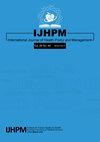利用疾病控制优先事项 3 方法应对全民保健挑战:巴基斯坦的经验教训和经验概述
IF 3.1
3区 医学
Q2 HEALTH CARE SCIENCES & SERVICES
International Journal of Health Policy and Management
Pub Date : 2023-10-08
DOI:10.34172/ijhpm.2023.8003
引用次数: 0
摘要
背景:巴基斯坦制定了首个国家基本卫生服务包(EPHS),作为加快实现全民健康覆盖(UHC)的关键一步。我们介绍了制定一揽子基本保健服务的基本原理、目标、所遵循的系统方法、所采用的方法、过程中取得的成果、遇到的挑战以及汲取的经验教训。方法:EPHS 的设计由国家卫生服务、法规和协调部领导。所采用的方法在技术上以疾病控制优先事项 3 国家翻译项目和现有的国家经验为指导。在确定优先事项和决策过程中,采用了参与式和以证据为依据的方法。成果:完整的 EPHS 涵盖了在社区、保健中心和一级医院平台上实施的 117 项干预措施,人均成本为 29.7 美元。EPHS 还包括一套额外的 12 项基于人口的干预措施,人均成本为 0.78 美元。由 88 项地区级干预措施组成的即时实施一揽子计划(IIP)的人均成本为 12.98 美元,将在政府卫生拨款增加到实施整个 EPHS 所需的水平之前,与基于人口的干预措施一起实施。在三级医疗保健平台上提供的干预措施也被列为优先事项,其人均成本为 6.5 美元,但未被纳入县级一揽子计划。全国 EPHS 采用同样的循证过程指导省级一揽子计划的制定。政府和发展伙伴正在分阶段实施综合投资计划。结论:EPHS 设计成功的关键因素要求关注一揽子计划的可行性和可负担性、国家自主权和领导权,以及国家利益相关方和发展伙伴的扎实参与。向实施过渡所面临的主要挑战是继续加强国家技术能力,将卫生部的优先事项确定和一揽子计划的设计及其修订制度化,解决卫生系统的差距,弥合目前的资金缺口,逐步扩大覆盖面,直至 2030 年。本文章由计算机程序翻译,如有差异,请以英文原文为准。
Addressing the UHC Challenge Using the Disease Control Priorities 3 Approach: Lessons Learned and an Overview of the Pakistan Experience
Background: Pakistan developed its first national Essential Package of Health Services (EPHS) as a key step towards accelerating progress in achieving Universal Health Coverage (UHC). We describe the rationale, aims, the systematic approach followed to EPHS development, methods adopted, outcomes of the process, challenges encountered, and lessons learned. Methods: EPHS design was led by the Ministry of National Health Services, Regulations & Coordination. The methods adopted were technically guided by the Disease Control Priorities 3 Country Translation project and existing country experience. It followed a participatory and evidence-informed prioritisation and decision-making processes. Results: The full EPHS covers 117 interventions delivered at the community, health centre and first-level hospital platforms at a per capita cost of US$29.7. The EPHS also includes an additional set of 12 population-based interventions at US$0.78 per capita. An immediate implementation package (IIP) of 88 district-level interventions costing US$12.98 per capita will be implemented initially together with the population-based interventions until government health allocations increase to the level required to implement the full EPHS. Interventions delivered at the tertiary care platform were also prioritised and costed at US$6.5 per capita, but they were not included in the district-level package. The national EPHS guided the development of provincial packages using the same evidence-informed process. The government and development partners are in the process of initiating a phased approach to implement the IIP. Conclusion: Key ingredients for a successful EPHS design requires a focus on package feasibility and affordability, national ownership and leadership, and solid engagement of national stakeholders and development partners. Major challenges to the transition to implementation are to continue strengthening the national technical capacity, institutionalise priority setting and package design and its revision in ministries of health, address health system gaps and bridge the current gap in financing with the progressive increase in coverage towards 2030.
求助全文
通过发布文献求助,成功后即可免费获取论文全文。
去求助
来源期刊

International Journal of Health Policy and Management
Health Professions-Health Information Management
CiteScore
5.40
自引率
14.30%
发文量
142
审稿时长
9 weeks
期刊介绍:
International Journal of Health Policy and Management (IJHPM) is a monthly open access, peer-reviewed journal which serves as an international and interdisciplinary setting for the dissemination of health policy and management research. It brings together individual specialties from different fields, notably health management/policy/economics, epidemiology, social/public policy, and philosophy into a dynamic academic mix.
 求助内容:
求助内容: 应助结果提醒方式:
应助结果提醒方式:


